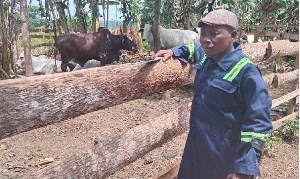The Dutch Minister of Development and Cooperation on Thursday advised African countries to carve their own economic destiny by developing "home grown" policies and institutional capacity building instead of adopting proposals prescribed by multilateral donors.
Speaking at a roundtable with representatives of civil society and policy makers in Accra, Ms Eveline Herfkens said although donor-prescribed proposals generally aim at improving the economy, they tend not to be conducive for the peculiar environment of the people.
"You should not wait to adopt structural adjustment conditionality imposed by these donors on you. Tell them to shut up and take a back seat while you take the initiative", said Ms Herfkens who arrived on Friday ahead of a visit by a Dutch government delegation led by the Prime Minister.
The Dutch Minister admitted that the manner in which international donors provided tied-aids to developing economies, particularly in Africa was nothing but an imposition.
"Technical assistance in the past was a tremendous waste of resources which in any case, did not make the intended impact on the beneficiaries", she said.
The roundtable, organized by the Netherlands Embassy at the Institute of Economic Affairs (IEA) provided the platform for the discussants to do a critique on the Ghana Poverty Reduction Strategy (GPRS) which most people feared might be another structural adjustment programme from multilateral agencies after similar ones in the past had failed to meet the expectations of the people.
These included the Highly Indebted Poor Country (HIPC) initiative, which has debt cancellation as its main thrust with poverty reduction as the end product.
Members of the Executive, diplomats, civil and public servants as well as operators in the private sector took part in the discussions.
Ms Herfkens said it should be possible for implementers of the HIPC proposals to make adjustments to suit their peculiar circumstances and not just swallow the concept in its entirety.
"HIPC is useless if the concerns of the people are not effectively addressed", she said likewise, the poverty reduction strategy policy "is not cast in stones".
Ms Herfkens said there was new opportunity open for developing countries like Africa to determine the priority areas for donor assistance and called for regular consultation among key players on the continent to enable them present a common voice in directing assistance towards effective poverty reduction.
She further tasked the authorities not to only focus on education and health needs of the people but also work towards boosting trade and employment opportunities.
The forum was unanimous that civil society needed to be strengthened as key players in formulation of good policies and vibrant democracy.
General News of Friday, 23 November 2001
Source: .












